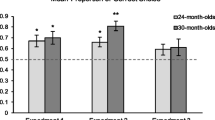Abstract
We explore the inductively derived views obtained by players with partial temporal (short-term) memories. A player derives his personal view of the objective game situation from his accumulated (long-term) memories, and then uses it for decision making. A salient feature that distinguishes this paper from others on inductive game theory is partiality of a memory function of a player. This creates a multiplicity of possibly derived views. Although this is a difficulty for a player in various senses, it is an essential problem of induction. Faced with multiple possible views, a player may try to resolve this using further experiences. The two-way interaction between behavior and personal views is another distinguishing feature of the present paper.
Similar content being viewed by others
References
Akiyama, E., Ishikawa, R., Kaneko, M., Kline, J.J.: A simulation study of learning a structure: mike’s bike commuting, SSM.DP.1190. http://www.sk.tsukuba.ac.jp/SSM/libraries/pdf1176/1190.pdf (2008)
Bacon, F.: Novum Organum, edited with Introduction, Notes, etc., by Thomas Fowler, 2nd edn. Oxford: Clarendon (1889/1589)
Camerer C.: Behavioral Game Theory. Princeton University Press, Princeton (2003)
Hall, B.K. (eds): Fins into Limbs: Evolution, Development, and Transformation. University of Chicago Press, Chicago (2007)
Hart S.: Robert Aumann’s game and economic theory. Scand J Econ 108, 185–211 (2006)
Hume D.: An Enquiry Concerning Human Understanding. Logmans, Green and Co., London (1889/1759)
Isbell J.: Finitary Games, Contributions to the Theory of Games, III, pp. 79–96. Princeton University Press, Princeton (1957)
Kaneko, M., Kline, J.J.: Small and Partial Views derived from Limited Experiences, University of Tsukuba, SSM.DP.1166, University of Tsukuba. http://www.sk.tsukuba.ac.jp/SSM/libraries/pdf1151/1166.pdf (2007)
Kaneko M., Kline J.J.: Inductive game theory: a basic scenario. J Math Econ 44, 1332–1363 (2008a)
Kaneko M., Kline J.J.: Information protocols and extensive games in inductive game theory. Game Theory Appl 13, 57–83 (2008b)
Kaneko, M., Kline, J.J.: Transpersonal understanding through social roles, and emergence of cooperation, University of Tsukuba, SSM.DP.1228, University of Tsukuba. http://www.sk.tsukuba.ac.jp/SSM/libraries/pdf1226/1228.pdf (2009)
Kaneko M., Matsui A.: Inductive game theory: discrimination and prejudices. J Public Econ Theory 1, 101–137 (1999) Errata: the same journal 3(2001):347
Kuhn H.W.: Extensive games and the problem of information. In: Kuhn, H.W., Tucker, A.W. (eds) Contributions to the Theory of Games II, pp. 193–216. Princeton University Press, Princeton (1953)
Mithen S.: The Prehistory of the Mind. Thames and Hudson Ltd, London (1996)
Piccione M., Rubinstein A.: On the interpretation of decision problems with imperfect recall. Games Econ Behav 20, 3–24 (1997)
Plato: Republic. In: Hamilton. E., Cairns, H. (eds.) The Collected Dialogues of Plato. Princeton: Princeton University Press (1989)
Rohatgi V.K.: Statistical Inference. Dover, New York (1984/2003)
von Neumann J., Morgenstern O.: Theory of Games and Economic Behavior. Princeton University Press, Princeton (1944)
Weibull J.W.: Evolutionary Game Theory. MIT Press, London (1995)
Author information
Authors and Affiliations
Corresponding author
Additional information
The authors thank Tai-Wei Hu and the referee for helpful comments on an earlier version of this paper.
The authors are partially supported by Grant-in-Aids for Scientific Research No.21243016, Japanese Society for the Promortion of Science, and Australian Research Council Discovery Grant DP0560034.
Rights and permissions
About this article
Cite this article
Kaneko, M., Kline, J.J. Partial memories, inductively derived views, and their interactions with behavior. Econ Theory 53, 27–59 (2013). https://doi.org/10.1007/s00199-010-0519-0
Received:
Accepted:
Published:
Issue Date:
DOI: https://doi.org/10.1007/s00199-010-0519-0




